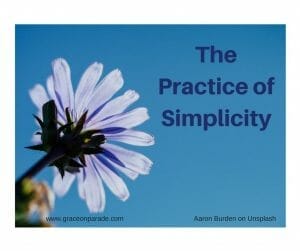 So far, in this Bible study on spiritual habits, we have looked at practices that develop our relationship with God. The next section of Richard Foster’s book, Celebration of Discipline, deals with lifestyle changes.The first chapter in this section is what he calls simplicity.
So far, in this Bible study on spiritual habits, we have looked at practices that develop our relationship with God. The next section of Richard Foster’s book, Celebration of Discipline, deals with lifestyle changes.The first chapter in this section is what he calls simplicity.
What images come to mind when you hear the word simplicity?
Foster describes simplicity as an inward attitude reflected in an outward lifestyle. Simply put, I would describe simplicity as the ability to not allow my life to be chained to too many things, whether status, possessions, activities, or responsibilities. Simplicity is seeking first the Kingdom of God (Mt 6:33).
The Bible doesn’t support the concept of simplicity as a spiritual practice as directly as it does the other topics we’ve discussed. However, it does address at length the topics of love of riches, stewardship and an attitude of giving; all attributes the Christian would be wise to practice.
Let’s look at the Word
What does the Bible say about wealth?
Read James 1:10,11 and James 2:5,6. What is the disadvantage of wealth?
Read Luke 12:13-21
- Verse 15 says that life does not consist of an abundance of possessions. What are we able to focus on and enjoy more in life if we are not consumed with possessions?
- Verses 16-20 tell the story of a fool who focused his life on his possessions. What happened to him?
- Look at verse 21. How can we be rich toward God?
- Read Matthew 6:19-21. What is the problem with accumulating wealth? What will happen to our wealth? What did Jesus mean by storing up treasures in heaven? What kind of treasures might those include?
Read Luke 16:10-12. How can we show that we are trustworthy in handling worldly wealth?
Read Matthew 6:25-34.
- How does practicing a life of simplicity aid us in not worrying?
- How do the birds and the flowers exhibit a simple lifestyle? What is the lesson for us?
- Why is worry about food and clothing unnecessary for the believer?

- Read Hebrews 13:5. Why is an anxiety about not having enough so foolish for the Christian? On what can we base our confidence?
Read Psalm 24:1. Who owns our stuff? How an understanding of God as the owner and we are the managers change our outlook on the accumulation of possessions and our generosity toward others?
What does the Bible say about giving?
Read 2 Corinthians 9:1-15
- What should be our attitude in giving?
- What will be the result of generous giving?
- How can we avoid feelings of compulsion when giving?
- Look at verse 8. What will happen when we are content with all that we have?
- Look at verses 10 and 11. What will happen to us when we give generously?
- Look at verses 12-14. What else will happen?
What are the benefits of simplicity?
If we want to be generous and manage our wealth well, it’s a good idea to strive toward a simpler lifestyle. Why is this a good idea?
I see several benefits of simplicity. Can you add to my list?
- Simplicity teaches self-control, especially in delayed gratification. I don’t have to have everything, and I don’t have to have everything now.
- Simplicity teaches generosity. When I don’t hold tightly to my possessions, I find I don’t need as much and I am more apt to give to others. After all, none of it belongs to me; it all belongs to the Lord (Psalm 24:1).
- Simplicity teaches contentment. If I train myself to live with less, I am content with what I have and I won’t fret as much for what I don’t have.
- Simplicity teaches gratitude. Owning too much causes us to take what we have for granted. Abundance lessens the value of what we have. We have so much, we begin to tune it out and even forget where we have certain things we once thought were precious to us. Our focus on stuff can distract us from taking time to stand in wonder at God’s natural creation.
- Simplicity teaches compassion for those who cannot have much but live in a world that taunts them with all that they could have. My simple lifestyle will make me more approachable to those who don’t have much and will demonstrate to the poor Christian that it is possible to live without all the extras the world wants to convince us that we need.
- Simplicity teaches attention on God. Having a lot of stuff means I need to care for that stuff. When I don’t have a lot, I have more time to focus on my worship, relationship, and service to God.
Additional Resources
Here are a few books you might be interested in reading on the subjects of wealth, generosity, and simple living. Do you know of other resources? Please share!
Giving It All Away and Getting It Back Again: The Way of Living Generously by David Green (CEO of Hobby Lobby).
The Treasure Principle: Unlocking the Secret of Joyful Giving, by Randy Alcorn
Living Simply: Choosing Less In A World Of More by Joanie Heim
Free of Charge: Giving and Forgiving In A Culture Stripped of Grace by Miroslav Volf


Being inspired by your teachings iam asking you to extend your partnership with us in UGANDA.
Thanks.
I would love if I may ask if I too could take the quiz seeking GOD for my word for the new year